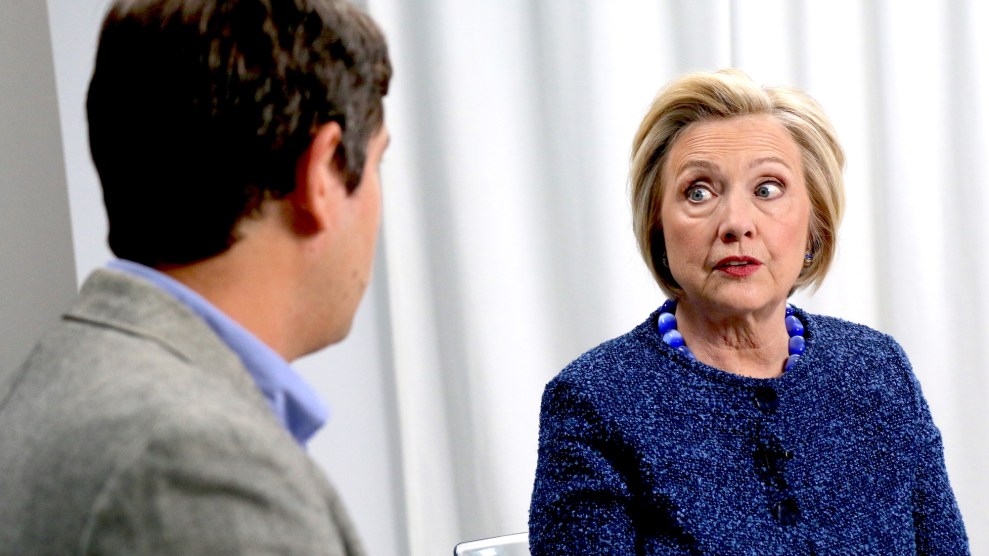A year after her defeat by Donald Trump in the 2016 presidential election, Hillary Clinton says “there are lots of questions about its legitimacy” due to Russian interference and widespread voter suppression efforts.
In an interview with Mother Jones in downtown Manhattan, Clinton said Russian meddling in the election “was one of the major contributors to the outcome.” The Russians used “weaponized false information,” she said, in “a very successful disinformation campaign” that “wasn’t just influencing voters—it was determining the outcome.”
Republican efforts to make it harder to vote—through measures such as voter ID laws, shortened early voting periods, and new obstacles to registration—likewise “contributed to the outcome,” Clinton said. These moves received far less attention than Russian interference but arguably had a more demonstrable impact on the election result. According to an MIT study, more than 1 million people did not vote in 2016 because they encountered problems registering or at the polls. Clinton lost the election by a total of 78,000 votes in Michigan, Pennsylvania, and Wisconsin.
“In a couple of places, most notably Wisconsin, I think it had a dramatic impact on the outcome,” Clinton said of voter suppression.
Wisconsin’s new voter ID law required a Wisconsin driver’s license or one of several other types of ID to cast a ballot. It blocked or deterred up to 23,000 people from voting in reliably Democratic Milwaukee and Madison, and potentially 45,000 people statewide, according to a University of Wisconsin study. Clinton lost the state by fewer than 23,000 votes. African Americans, who overwhelmingly supported Clinton, were more than three times as likely as whites not to vote because of the law.
“It seems likely that it cost me the election [in Wisconsin] because of the tens of thousands of people who were turned away and the margin being so small,” Clinton said.
She noted that this was the first presidential election in more than 50 years without the full protections of the Voting Rights Act after the Supreme Court gutted the law in a 2013 ruling, and 14 states had new voting restrictions in effect for the first time. “So many places have really tried to make it as difficult as they possibly could for young people, for African Americans, the elderly, to vote,” she said.
For Clinton and others who question the legitimacy of the election results, particularly due to Russian interference, there’s not an obvious next step. “We don’t have a method for contesting that in our system,” she said. “That’s why I’ve long advocated for an independent commission to get to the bottom of what happened.” On Wednesday, Democrats in Congress introduced articles of impeachment against Trump, but Clinton thinks that’s the wrong approach. “I think we need the investigations to continue,” she said, “and I think that it’s premature.”
But Clinton stood by a claim she made during a presidential debate last year, that if Trump were elected president, he would be Putin’s “puppet.” Asked if she still felt that way, Clinton said, “I do.”
“I don’t know how the president of the United States, with all of the concerns about the integrity of our elections, could meet with Putin just recently and basically say, ‘Well, you know, he told me again he didn’t do it,’” she said. “I can’t believe that he’s so naïve. I think that he hopes or expects the rest of us to be naïve, or at least the people who support him to be naïve. But this is a serious cyberattack on America.”

The impact of Russian interference in the election can be measured in a few tangible ways. Operatives in Russia published about 80,000 Facebook posts that reached 126 million Americans, as Russia-linked Facebook ads targeted swing states like Michigan and Wisconsin. More than 36,000 Russia-linked Twitter accounts generated 1.4 million tweets about the election that had 288 million impressions. The constant drumbeat of stories based on Clinton campaign and Democratic Party emails obtained by Russian-backed hackers is one reason that then-FBI Director James Comey’s 11th-hour letter hurt Clinton so much.
Clinton admitted that her campaign had “shortcomings” that contributed to her loss, but she said the stakes of Russian meddling were bigger than just the election result. “If we don’t figure out what they did to us and take adequate steps to prevent it, they’re only going to get better,” she said. “This is the first time we’ve ever been attacked by a foreign adversary and then they suffer no real consequences.”
The interview came amid a slew of new allegations of sexual assault against prominent figures in politics and entertainment. Asked why the various sexual assault allegations against Trump haven’t stuck when similar ones have recently ended careers, Clinton said she couldn’t explain it. “I don’t understand a lot about how he got away with so many attacks and insults and behaviors that allowed him to win the presidency,” she said. “I think part of it is because a lot of people really saw him more as an entertainment figure.”
She added, “It’s something that people are going to be scratching their heads about a long time.”
















